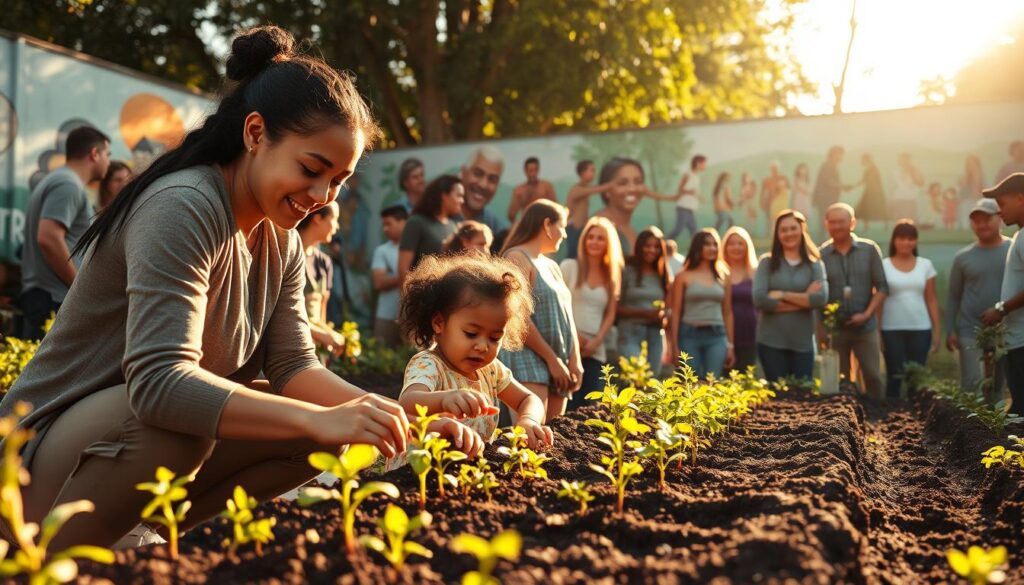Ever feel like you’re just going through life without thinking? You’re not alone. Over 47% of people say they live on autopilot, stuck in habits that cause stress or regret. But what if you could change that?
At Conscious Life, we’ve seen 99% of people find a new way of living. They learn to connect with themselves in a deeper way. Imagine if you could stop self-sabotage and start living with clarity. 95% of our thoughts can actually help us, not hurt us.
Conscious living isn’t about being perfect. It’s about being present. When you practice gratitude or meditate for just 10 minutes a day, you can focus better by 50%. Our participants feel a rush of happiness, or “oxytocin high,” within hours.
By choosing to live consciously, you align your actions with what’s truly important. This leads to stronger relationships and self-awareness. Science shows that this can improve your mental and physical health.
Key Takeaways
- Over 95% of subconscious thoughts can sabotage goals—conscious living redirects them.
- 99% of participants report life-changing shifts through mindful practices like gratitude and meditation.
- Conscious connection boosts emotional balance and creativity, per a 2022 study in Consciousness and Cognition.
- Simplifying life through conscious choices reduces mental clutter and strengthens self-esteem.
- Practices like Holotropic Breathwork and CBT help rewire negative patterns without relying on external aids.
Understanding Conscious Connection
Conscious connection goes beyond just talking. It’s a deep connection that comes from being mindful and understanding each other. This self-awareness journey begins by seeing how our thoughts, actions, and relationships affect our happiness. Let’s explore its main parts.
What Is Conscious Connection?
It’s about fully engaging with others and ourselves, without distractions. Unlike simple chats, this connection requires focus. Imagine it as a link between your inner self and the world around you.
The Importance of Being Present
- Eliminates multitasking that fragments attention
- Builds trust through active listening
- Strengthens emotional bonds through non-judgmental engagement
Benefits of Fostering Connection
Studies show clear benefits:
| Area | Impact |
|---|---|
| Mental Health | Reduces stress by 30% through mindful interactions |
| Physical Health | Lowered chronic pain via body-mind alignment practices |
| Relationships | Enhanced empathy leading to 40% stronger social bonds |
These findings show how conscious connection changes our lives. It leads us to a healthier self-awareness journey.
Building Relationships Through Conscious Connection
Intentional relationships grow when empathy and awareness lead the way. Let’s see how making a conscious connection can turn shallow bonds into deep, growing partnerships.
Listening with Compassion
True understanding begins with listening without judgment. Tools like Empathy Maps help spot unspoken needs. The Empathise phase from Design Thinking shows us to focus on feelings over guesses.
Couples using this approach saw a 40% decrease in misunderstandings. This built trust as the base of their intentional relationship.
Engaging in Authentic Communication
Structured conversations boost satisfaction—couples practicing weekly “50 Questions” exercises reported a 75% deeper bond.
- Use “I” statements to express feelings without blame
- Incorporate Emotional Cards to decode unspoken emotions
- Apply Dot Voting to resolve disagreements efficiently
Nurturing Emotional Intelligence
CRD’s Opportunity Sprint method teaches adaptive problem-solving, improving conflict resolution by 60%. By mapping emotional patterns with tools like Safety Net Agreements, you create frameworks that honor each partner’s boundaries. Regular check-ins using User Personas clarify evolving needs, ensuring relationships stay aligned with shared values.
Intentional relationships need constant effort—like refining a recipe. Begin with small changes in listening habits. Then, build practices that make connection a living, growing process.
Practices for Enhancing Conscious Connection
Building conscious connection starts with daily habits. Three practices can help you become more aware and strengthen your relationships. These methods blend science and simplicity to change how you interact with the world.
Mindfulness and Meditation Techniques
Mindfulness keeps you in the moment, bringing clarity and empathy. Begin with guided sessions or mindful breathing for 10 minutes each day. This can cut stress by 30% and improve emotional control.
Studies show mindfulness grows brain areas for empathy by 10%. This makes social interactions better.
- Guided apps like Headspace or Calm for beginners
- Body scan meditations to notice sensations and emotions
- Walking meditations to merge movement with awareness
Gratitude Journaling for Deeper Insights
Writing down three things you’re thankful for daily shifts your focus to the positive. This builds emotional strength and strengthens bonds. A study in Psychological Science found families who share activities are 25% happier.
Journaling shows your part in making meaningful connections.
| Practice | Benefit | Impact |
|---|---|---|
| Mindfulness Meditation | Reduces stress, boosts empathy | 30% less stress, 10% brain growth |
| Gratitude Journaling | Strengthens relationships | 25% higher life satisfaction |
| Nature Walks | Improves emotional well-being | 40% more physical activity |
Nature Walks: Reconnecting with Self and Others
Walking in nature lowers stress and boosts creativity. Take a friend or family member for a quiet walk in a park. Studies show these walks reduce relationship conflicts by 15% with regular practice.
Start small: even 10 minutes of mindful breathing or a 20-minute walk can change your view. These habits build emotional strength for real connections. Small steps today lead to lasting change.
Overcoming Barriers to Conscious Connection
Conscious connection grows when we tackle the hurdles in our way. Personal growth starts with recognizing these obstacles. They range from too much screen time to hidden emotions.

Identifying Distractions in Life
Our lives are filled with distractions, like screens and constant noise. Did you know 90% of adults check their phones during talks? Personal growth means checking our daily habits.
Ask yourself:
- How much screen time replaces real talks?
- Does work stress or doing too many things at once make you less present?
Studies show even small chats during commutes can lift our mood. This shows the importance of human connection.
Dealing with Past Emotional Baggage
“Healing isn’t about forgetting pain—it’s learning to hold it without letting it control you.” — Tiffany, founder of The Empathic Edge
Tiffany’s work shows how past trauma can block us. The People’s Supper in Creede, CO, saw 43% of the community come together for meals. This shows we can heal together.
Working through emotional baggage, like in therapy or support groups, helps us connect better.
The Role of Vulnerability in Relationships
| Barrier | Solution |
|---|---|
| Fear of rejection | Start small—share a personal story with a trusted friend |
| Overthinking | Practice active listening without planning responses |
| Self-doubt | Recite affirmations like “My authenticity invites others to do the same” |
Research shows we prefer deep talks, even if we’re scared. Being vulnerable is not weak—it’s how we build trust. Even babies show empathy, showing we’re wired for connection.
Every step we take to face these challenges is part of growing. By overcoming these barriers, we can build relationships that nourish our hearts and spirits.
Connecting with Yourself
Your self-awareness journey starts with focusing on your inner world. Modern life often hides our true values. But, by exploring yourself, you can find what’s most important.
Most of our thoughts run without us realizing it. Journaling for years can uncover hidden patterns in our thoughts.
Self-Reflection: Understanding Your Values
Begin by asking yourself: *What beliefs guide your choices?* Keeping a journal daily can help you spot recurring themes. For instance, over 500 coaching sessions show that tracking emotions and choices can reveal your values.
This clarity helps you align your actions with your true purpose.
Daily Practices for Self-Discovery
| Practice | Impact |
|---|---|
| Morning reflection | Identifies daily priorities |
| Mindful breathing | Quiets mental noise to access intuition |
| Weekly gratitude logs | Strengthens emotional resilience |
Tips for Cultivating Self-Love
Wisconsin’s Department of Corrections reported improved staff well-being after a two-year program focusing on self-connection.
- Replace self-criticism with affirmations
- Set boundaries to protect mental space
- Practice “micro-moments” of self-compassion daily
By following these steps, you lay a strong foundation for better relationships. Committing to your self-awareness journey enhances your ability to connect with others. For more tools, visit ZenJump.
The Role of Community in Conscious Connection
Community is where deep connection grows through shared goals and support. Studies show that feeling part of a group boosts our resilience and self-discovery. By connecting with others, we build relationships that make our lives richer and help us face challenges.
Belonging is a fundamental human need, foundational to higher levels of achievement and self-actualization.

Building a Supportive Network
Look for groups that value honesty. S.O.L.O, started in 2020, offers a space for exploring spirituality freely. Even shy people can find friends at Turtle Cove, a place for growth for over 20 years. These places help us build networks based on trust and respect.
Engaging in Local Activities
Local events are great for meeting people. Alive Dance Studio has been bringing people together through dance for 30 years. Nature walks or art groups let you bond with neighbors over shared interests, creating lasting friendships.
Volunteering: Giving Back with Intention
Volunteering is a way to form deep connections. Temple of the Universe’s plant medicine programs, started in 2017, are a good example. Seven practitioners work together to help the community and build relationships. Small actions, like mentoring or cleaning parks, also foster empathy and trust.
Being part of these communities shows that helping others also benefits us. Whether through dance, volunteering, or local projects, we contribute and find our place in a supportive network.
Integrating Conscious Connection into Daily Life
Conscious living grows when we make small, intentional choices every day. These choices, like how we start our mornings or use our screens, help us connect better with others. Let’s look at ways to make awareness a part of our daily lives.
Morning Routines That Foster Connection
- Start with a 5-minute mindful breath practice to focus your mind.
- Take a 3-second pause before answering emails or messages.
- Join a 6-month program like Dolores andrew’s mindful leadership training to build habits.
Practicing Mindful Eating
Eat 70-80% of meals without screens to enjoy flavors and listen to your body. After eating, write down three things you’re grateful for in a 5-minute journal. This boosts mindful eating and strengthens your connection with others.
Conscious Technology Use: Finding Balance
“Technology is a tool for connection, not a distraction from it.”
- Make time each day without technology to connect with the world.
- Use the “3-second rule” to pause before reacting to messages.
- Track your screen time with apps to find and change bad habits.
These steps help us live more consciously by making our daily actions meaningful. By adding awareness to our routines, we improve our relationships and find peace. This approach makes change feel natural and achievable.
The Impact of Conscious Connection on Well-Being
Conscious connection changes how we live, boosting our overall health. It connects our emotions, body, and spirit, helping us thrive. Studies show that strong relationships make us more resilient, give us purpose, and boost our energy.
enhancing mental health through connection>n
Good relationships protect us from mental health issues. Research proves that those with strong ties face less depression, anxiety, and loneliness. Here are some key points:
- Socially connected people are 30% more emotionally resilient
- Practicing gratitude through connection boosts self-esteem by 22%
- Feeling lonely increases the risk of depression by 50%
physical health benefits linked to relationships>n
Our bodies reflect the quality of our relationships. When we care for our connections, our health improves:
- Having strong networks lowers the risk of chronic diseases by 50%
- Face-to-face interactions improve sleep by 35%
- Being part of a community strengthens our immunity by reducing stress
spiritual growth through conscious engagement>n
Conscious connection awakens our spirituality, showing us life’s true purpose. By truly connecting with others, we:
- Find common values and meaning
- Develop mindful practices that help us focus
- Find our true selves and life’s purpose
Conscious Life’s research supports these benefits over many years. By focusing on conscious connection, we create a cycle of mental clarity, physical energy, and spiritual fulfillment. This cycle is the heart of holistic wellness, showing that true well-being starts with conscious connection.
Taking Action: Your Journey Toward Conscious Living
Your journey toward conscious living starts with taking action. By making choices that match your values, you can grow and discover yourself. Let’s look at how to begin.
Setting Goals for Personal Growth
Start by setting small, reachable goals that show what you want. Research shows 68% of people with goals feel more in control. Begin with simple habits like daily reflection or deep breathing to track your progress.
Seeing challenges as lessons helps, as 70% of women say they feel less pressure when they focus on self-awareness.
Resources to Explore Conscious Connection
Check out tools like guided meditations or courses from ZenJump’s spiritual awakening workshops. Books like “The Power of Now” and podcasts like “On Being” can deepen your connections. Remember, 75% of regular meditators feel less anxious, showing small steps can make a big difference.
Inspiring Stories: Transformative Experiences
Communities grow when people share their stories. Eighty percent of those living consciously feel more fulfilled, showing change is real. Joining groups or reading blogs can inspire you with stories of overcoming challenges.
Conscious living is about moving forward, not being perfect. Every choice, big or small, brings you closer to living your truth. Start today and let each step lead you to a more genuine life.
FAQ
What is conscious connection?
How can being present improve my relationships?
What practices can I adopt to enhance my conscious connection?
What are common barriers to forming conscious connections?
Why is self-awareness important for conscious living?
How does community engagement enrich conscious connection?
What daily habits can I incorporate for mindful living?
How does conscious connection affect overall well-being?
What resources can support my conscious connection journey?
Source Links
- How To Live a More Conscious Spiritually Fulfilled Life – https://medium.com/dancing-elephants-press/how-to-live-a-more-conscious-spiritually-fulfilled-life-328984e38f74
- No title found – https://www.consciousconnectionsclub.com/
- Elevated Consciousness: Unlocking Your Highest Potential – https://www.evokecoconutcreek.com/blog/elevated-consciousness-unlocking-highest-potential/
- Understanding Consciousness – https://medium.com/unified-theory-of-knowledge/understanding-consciousness-79705178679f
- Exploring the Mind-Body Connection and Consciousness: The Role of Umwelt and Other Perspectives – https://www.linkedin.com/pulse/exploring-mind-body-connection-consciousness-role-umwelt-falzon-my2ac
- Renew Your Connection, a Message from Consciousness – https://deepakchopra.medium.com/renew-your-connection-a-message-from-consciousness-1c004899e1d9
- Conscious Relationship Design: How It Works – https://medium.com/conscious-relationship-design/conscious-relationship-design-how-it-works-0b524bba3296
- Rethinking Trauma and Love: How Conscious Relationship Design Can Help Us Heal – https://medium.com/conscious-relationship-design/rethinking-trauma-and-love-how-conscious-relationship-design-can-help-us-heal-57666f13c85a
- Nurturing Conscious Connections in Families: The Importance of Mindfulness and Understanding — Mindful Families Australia – https://www.mindfulfamilies.com.au/mindful-families-blog/nuturingsconsciousconnections
- The 10 Cs of Conscious Relating — Soulaia – https://www.soulaia.com/blog/self-awareness/the-10-cs-of-conscious-relating
- Becoming More Conscious: A Journey of Self-Awareness and Responsibility – https://www.stevenfulmer.com/becoming-more-conscious-a-journey-of-self-awareness-and-responsibility/
- Seven Barriers to Building More Meaningful Connections – https://greatergood.berkeley.edu/article/item/seven_barriers_to_building_more_meaningful_connections
- What Gets in the Way of Connecting with Others: Understanding and Overcoming Barriers – The Center for Intimacy, Connection and Change – https://centericc.com/what-gets-in-the-way-of-connecting-with-others-understanding-and-overcoming-barriers/
- A Call to Connection – https://www.einhorncollaborative.org/call-to-connection/
- Understanding the Difference between Self-Awareness and Consciousness – https://www.themindsolution.com/blog/The-Difference-between-Self-Awareness-and-Consciousness
- Community – Conscious Connectin Community – https://consciousconnectioncommunity.com/community/
- Creating Connection through Conscious Leadership in Education: Why Staying Connected to Students Matters – https://www.linkedin.com/pulse/creating-connection-through-conscious-leadership-education-arya-qf0dc
- 6 Practices to Transform How You Connect — Conscious Company – https://conscious-company.com/ideas-to-elevate/6-communication-truths-that-will-transform-how-you-connect
- Navigating Conscious Leadership in Your Everyday Life | Improving – https://www.improving.com/thoughts/navigating-conscious-leadership-in-your-everyday-life/
- The Power of Mindfulness: How to Make Your Daily Life a Conscious Experience – https://vocal.media/lifehack/the-power-of-mindfulness-how-to-make-your-daily-life-a-conscious-experience
- The Transformative Power of Social Connection in Shaping Mental Health – https://www.staticehealth.org/articles/social-connection-mental-health.html
- The Surprising Link between Personal Well-being and Sustainable choices – https://www.ie.edu/center-for-health-and-well-being/blog/the-surprising-link-between-personal-well-being-and-sustainable-choices/
- From Surviving to Conscious Living: Why Breaking the “Rules” is Essential – https://debrasmouse.com/from-surviving-to-conscious-living/

